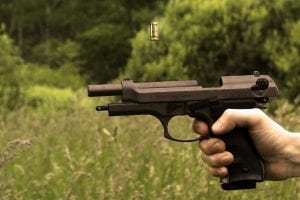 If you are a gun collector, or maybe just a gun owner, you may be wondering, what is the best way to pass on your firearms to your heirs? You may have even heard of a gun trust, a specific type of trust designed to address to the unique laws applicable to firearms. A gun trust can be beneficial in handling the inheritance of certain types of weapons, especially those that are governed by federal and state regulations. At the very least, you want to keep your heirs from inadvertently violating the law.
If you are a gun collector, or maybe just a gun owner, you may be wondering, what is the best way to pass on your firearms to your heirs? You may have even heard of a gun trust, a specific type of trust designed to address to the unique laws applicable to firearms. A gun trust can be beneficial in handling the inheritance of certain types of weapons, especially those that are governed by federal and state regulations. At the very least, you want to keep your heirs from inadvertently violating the law.
Whether it is necessary to place certain weapons in a gun trust depends on the type of weapon and whether it is regulated. There are two federal laws that might apply: the National Firearms Act of 1934 (NFA) and Title II of the Gun Control Act of 1968, which revised the NFA. NFA weapons include machine guns, silencers, short-barreled rifles, and short-barreled shotguns (including sawed-off shotguns), grenades, and other similar weapons.
Under federal law, NFA weapons are required to have a serial number and be registered with the federal Bureau of Alcohol, Tobacco, Firearms and Explosives, commonly referred to as the ATF. An NFA firearm can only be possessed and used by the registered owner. For this reason, special arrangements need to be made in order to pass these weapons on to someone else. The catch is, if such a weapon has not already been registered, it cannot later be registered and is illegal to own. To transfer a registered firearm, the owner must obtain ATF approval and pay a $200 tax on most transfers. It also requires receiving permission from the local chief law enforcement officer (CLEO) and being fingerprinted and photographed.
There are several advantages to utilizing a gun trust. First, the trust can help you to avoid certain federal transfer requirements. For example, if you name more than one trustee of your gun trust, each of those individuals will have the right to possess or use the trust firearms. Also, you can draft your trust in a way that it remains in effect after your death. Since the firearms remain in the trust at your death, the need to transfer those firearms is avoided. In other words, your heirs will not be required to pay the $200 transfer tax and satisfy the other transfer requirements.
The typical executor is not familiar with the various rules and regulations governing ownership and possession of NFA and other weapons. That means, without proper guidance, your executor could violate criminal laws by transferring a weapon in your estate without going through the proper procedure. An executor could also make a mistake by taking or sending an NFA weapon to a state where it is prohibited or giving it to a person who is not permitted by law to own that weapon. However, if you use a gun trust, those issues can be handled ahead of time.
The Gun Control Act makes it unlawful for certain individuals to possess firearms. For instance, the following categories of people are restricted from possessing firearms, among others:
A gun trust is different from the common revocable living trust. A simple living trust provides for the transfer of trust assets without going through probate court. This generally saves time and money after your death. A living trust often terminates shortly after your death, after the trust assets have been distributed to your heirs.
A gun trust, on the other hand, commonly has multiple trustees and is intended to last for more than one generation. Gun trusts must also take into account state and federal weapons laws. For these reasons, it is important to consult a lawyer who has significant experience with the applicable state and federal laws governing the legal use and possession of weapons and how they must be transferred.
If you have questions regarding gun trusts or any other estate planning needs, please contact Anderson, Dorn & Rader, Ltd., either online or by calling us at (775) 823-9455. Attend a free Webinar!




